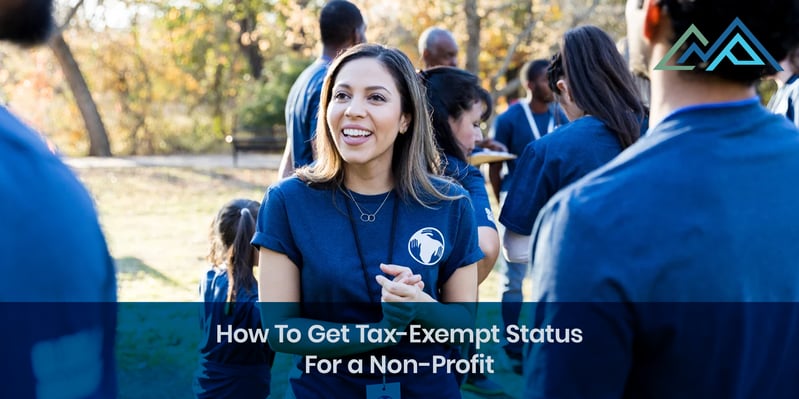This post was originally published March 08, 2017, and extensively updated February 01, 2021.
So, you are starting a nonprofit organization or are now part of one. Congratulations. A lot of the good in the world is done because somebody was brave and selfless enough to start a nonprofit. The last thing you want to worry about when starting a nonprofit is issues with the business organization or taxes.

At CMP, we work with business owners daily, including many nonprofit organizations (NPO's). They often ask us how to get tax-exempt status for their companies, and we help them navigate the process.
With this in mind, we've created this post to help you understand which companies are tax-exempt, what it means to be tax-exempt, and the steps to follow to get tax-exempt status for your company.
What is Considered a Nonprofit Organization?
It's pretty self-explanatory, but it's an organization with no primary goal of making a profit. The main mission usually focuses on a shared goal, cause, or further social issues. People will often say 'nonprofit' when describing all NPO's or NPFO's (a not-for-profit organizations). Congress has created around three dozen different types of nonprofits.
Here are some of the more popular types:
- Section 501(c)(3): corporations, funds or foundations that operate for religious, charitable, scientific, literary or educational purposes
- Section 501(c)(4): civic leagues and social welfare organizations, homeowners associations, and volunteer fire companies.
- Section 501(c)(5): such as labor unions
- Section 501(c)(6): such as chambers of commerce.
- Section 501(c)(7): such as social and recreational clubs
- Section 501(k): childcare-related organizations.
There are also others. The U.S. Internal Revenue Code contains many different classifications of tax-exempt groups. Courtesy of Foundation List.
Are Nonprofits Tax Exempt?
It is a common misconception that all nonprofit companies are tax-exempt. While many of them qualify, others do not. When an organization qualifies for tax exemption, it is not required to pay federal income tax and certain state taxes, including property tax and sales tax.
Tax exemption requires nonprofits to meet the following four basic qualifications:
- A tax-exempt nonprofit must have a lawful purpose that falls into one of the following categories: charitable, educational, literary, religious, scientific, fostering qualified national or international sporting competitions, testing for public safety, or preventing cruelty to animals or children.
- A public charity must derive at least one-third of its income from public donations.
- Tax-exempt nonprofits classified as 501(c)(3) organizations must not engage or participate in any political campaign or spend money for political purposes. They must state the above in their organizing papers. (Note that this applies only to the 501(c)(3) designation. Other nonprofits may not be prohibited from political activity.)
- A nonprofit must state in its organizing papers that it will not distribute its assets or income to any individual except as fair compensation for work or services rendered. They must further state that their income will not be used for the personal gain of the organization's founder, employees, relatives, or supporters.
If your organization meets the above requirements, then it is likely that you will qualify for tax-exempt status.
Wondering about the difference between Form 1023 and 1023-EZ? Understanding which form fits your nonprofit is key to securing tax-exempt status. Explore the details, avoid pitfalls, and take the right steps toward achieving your organization’s goals.
What Does It Mean to Be Tax Exempt?
Nonprofit organizations are created according to state law. A corporation that is organized for charitable purposes may be tax-exempt, but cannot earn that status unless the appropriate paperwork is filed with the federal and state government. Nonprofit status does not automatically convey tax exemption.
The rules of creating a nonprofit organization may vary from state to state. Some businesses that may qualify for tax exemption include:
- Nonprofit organizations
- Charitable trusts
- Some limited liability companies
- Unincorporated associations
Partnerships do not qualify for tax-exempt status.
When your organization qualifies for tax exemption, you will still need to file an annual information return with the IRS. Smaller companies, defined as those with gross receipts of $50,000 or less, might only be required to file IRS Form 990-N, which is also known as the e-postcard.
Your tax-exempt status means that you will not be required to pay federal or state income taxes, state property tax, or state sales tax if applicable. It does not exempt you from all taxes. For example, you will still need to pay the employer's share of Medicare and Social Security taxes and withhold and pay the employee's share of those taxes.
One final note: if your organization engages in some business transactions that do not qualify for tax exemption, you will be required to file a tax return and pay federal and state income taxes on that income. You can find additional information on the IRS website.
Before Applying for Tax Exempt Status for a Nonprofit
Before you apply for tax-exempt status for your nonprofit, there are some basic steps you should take to streamline the process and make your approval more likely. The Internal Revenue Service says that an organization must:
- Determine whether your organization is a trust, association, or corporation. You must be classified as one of the above to be exempted from paying taxes. As we mentioned earlier, partnerships cannot qualify for tax-exempt status.
- Gather your organizational documents. Each state has its own rules for organizing and registering businesses. For example, you may need Articles of Incorporation, an LLC operating agreement, corporate minutes, and a stock agreement.
- Research your state's organization requirements. Before you file for tax exemption, it's your responsibility to familiarize yourself with the rules in your state to determine if your organization qualifies for tax exemption.
- Obtain an Employer Identification Number (EIN) for your organization.
Charitable organizations must apply for federal income tax exemption. Failing to complete these steps may delay your approval for tax exemption even if your charitable organization meets every requirement.
Steps to Get Tax-Exempt Status for a 501(c) Nonprofit
The process of getting tax-exempt status for charitable organizations, public charities, and other nonprofits is not complicated, but the Internal Revenue Code is explicit about the steps to be followed. Nonprofits organized under section 501(c)(3) and other nonprofits should follow these steps.
There are five stages to getting tax-exempt status for your nonprofit. They cover everything from creating your organization to maintaining and protecting your tax-exempt status once you have it.
- Plan the purpose of your organization. The section above that lists the requirements for exemption from taxes should be your guide. If your organization fits one of the descriptions, you may be able to qualify for an exemption.
- Form a corporation and file the necessary paperwork. Remember, incorporating as a nonprofit happens under state rules and it's your responsibility to learn what is required.
- Follow all state and local requirements for public charities and nonprofit organizations. You can only be exempt from federal income tax if you meet state requirements.
- File the necessary paperwork with the IRS. The forms vary depending on the structure of your organization. For example, 501(c)(3) organizations must file Form 1023 to be exempt from federal income tax. You can find additional information on the IRS website about tax-exempt status, here.
- Maintain your tax-exempt status. Once you have received recognition of exemption, it is your responsibility to follow state laws and federal tax code when you receive tax-deductible contributions, pay employees, and so on. You will also be required to use Form 990 or Form 990-EZ to report details of your organization's activities, expenses, revenue, and net assets to the IRS. Failure to do so could result in the loss of your 501(c)(3) status.
Provided that you operate per the nonprofit requirements and federal tax laws, you will not have any difficulty maintaining your tax-exempt status.
Cost to File for 501(c)(3) Tax Exemption
The cost of filing as a 501(c)(3) organization is something that may be a concern, particularly to small nonprofits and startups. You have several options when it comes to filing.
The first option is to prepare the paperwork yourself. While this might seem like the best option, you should know that the process of researching state requirements and completing paperwork can be time-consuming. You won't need to pay high fees to do the work yourself, but it may take you a hundred hours or more of work to finish the task. That may not be the best use of your time.
The second option is to use an online service that gives you access to forms and provides you with some basic information about how to prepare them. This option will cost between $400 and $600. However, there are some potential pitfalls with both options. If you make a mistake in your paperwork or miss a step, you may not be approved for 501(c)(3) status.
The third option is to hire a CPA or attorney to complete the necessary paperwork on your behalf. The cost may range from $2,000 to $4,000. While this is the most expensive option, it is also the one with the best chance of success. An experienced CPA understands the ins and outs of filing under section 501(c)(3) and can help you navigate potential roadblocks, thus increasing the chances that you will receive recognition of exemption.
IRS Approval Time for Nonprofit Tax Exempt Status
When you file for nonprofit tax-exempt status, under Section 501(c)(3) of the internal revenue code or elsewhere, it's natural to be impatient about receiving recognition of exemption for your federal tax and state taxes.
It may take some time to get a response from the IRS, even if you submit all the required forms. It's been reported, that it may take anywhere from two months to a year to get a response from the IRS. If you leave out necessary information or the IRS has questions, it can take even longer.
According to the IRS website, they process applications for tax-exempt status as quickly as possible. You can refer to their publication entitled Top Ten Tips to Shorten the Tax-Exempt Application Process for additional information about how to streamline the process.
Protect Your Non-Profit Tax Exempt Status
Once you have been approved for tax-exempt status, you must maintain and protect your status. You will need to take your responsibilities seriously regarding how you conduct your business and report income. Likewise, you'll need to avoid breaking any of the rules that might jeopardize your exemption.
Let's start with the things you'll need to do. They include:
- Establishing a board of directors.
- Adhering to the stated purpose that qualified you for tax-exempt status.
- Documenting tax-deductible contributions.
- Adhering to a strict approval process for all contracts.
- Filing annual information returns with the IRS.
- Reporting all taxable income and paying taxes when required.
On the other side of the equation, the organization must be careful not to:
- Engage in any political campaigns or make political donations.
- Engage in lobbying that is not specifically allowed under 501(c)(3) rules.
- Use the organization's income for private benefit or inurement.
Provided you meet the requirements for maintaining your exempt status and avoid violating any of the prohibitions as described by the IRS, you should have no difficulty maintaining your status as a tax-exempt nonprofit organization.
Tax Professionals Dedicated to the Nonprofit Community
Completing an application for tax-exempt status may be a daunting process for any public charity or nonprofit organization. Before applying, it is essential to understand the federal and state requirements for an exemption so you can provide the necessary information.
To avoid delays and start the process quickly, we recommend working with a tax professional dedicated to the nonprofit community. At CMP, we offer an array of accounting and tax services for nonprofits. Contact us today to learn more or schedule an appointment.


















